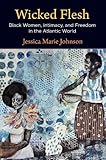Wicked Flesh : Black Women, Intimacy, and Freedom in the Atlantic World / Jessica Marie Johnson.
Material type: TextSeries: Early American StudiesPublisher: Philadelphia : University of Pennsylvania Press, [2020]Copyright date: ©2020Description: 1 online resource (360 p.) : 15 illusContent type:
TextSeries: Early American StudiesPublisher: Philadelphia : University of Pennsylvania Press, [2020]Copyright date: ©2020Description: 1 online resource (360 p.) : 15 illusContent type: - 9780812297249
- African American women -- Louisiana -- New Orleans -- History -- 18thcentury
- African American women -- Louisiana -- New Orleans -- Social conditions -- 18th century
- African Americans -- Kinship -- History -- 18th century
- African diaspora -- History -- 18th century
- Slave trade -- Social aspects -- Atlantic Ocean Region -- History -- 18thcentury
- Women, Black -- Atlantic Ocean Region -- History -- 18th century
- Women, Black -- Atlantic Ocean Region -- Social conditions -- 18th century
- HISTORY / United States / Revolutionary Period (1775-1800)
- African Studies
- African-American Studies
- American History
- American Studies
- 305.48/896073 23
- online - DeGruyter
| Item type | Current library | Call number | URL | Status | Notes | Barcode | |
|---|---|---|---|---|---|---|---|
 eBook
eBook
|
Biblioteca "Angelicum" Pont. Univ. S.Tommaso d'Aquino Nuvola online | online - DeGruyter (Browse shelf(Opens below)) | Online access | Not for loan (Accesso limitato) | Accesso per gli utenti autorizzati / Access for authorized users | (dgr)9780812297249 |
Browsing Biblioteca "Angelicum" Pont. Univ. S.Tommaso d'Aquino shelves, Shelving location: Nuvola online Close shelf browser (Hides shelf browser)

|

|

|

|

|

|

|
||
| online - DeGruyter Digging the Past : How and Why to Imagine Seventeenth-Century Agriculture / | online - DeGruyter Revolutions and Reconstructions : Black Politics in the Long Nineteenth Century / | online - DeGruyter Electoral Capitalism : The Party System in New York's Gilded Age / | online - DeGruyter Wicked Flesh : Black Women, Intimacy, and Freedom in the Atlantic World / | online - DeGruyter Modern Constitutions / | online - DeGruyter The Patrons and Their Poor : Jewish Community and Public Charity in Early Modern Germany / | online - DeGruyter The Broadside Ballad in Early Modern England : Moving Media, Tactical Publics / |
Frontmatter -- Contents -- Introduction. The Women in the Water -- Chapter 1. Tastemakers: Intimacy, Slavery, and Power in Senegambia -- Chapter 2. Born of This Place: Kinship, Violence, and the Pinets’ Overlapping Diasporas -- Chapter 3. La Traversée: Gender, Commodification, and the Long Middle Passage -- Chapter 4. Full Use of Her: Intimacy, Service, and Labor in New Orleans -- Chapter 5. Black Femme: Acts, Archives, and Archipelagos of Freedom -- Chapter 6. Life After Death: Legacies of Freedom in Spanish New Orleans -- Conclusion. Femmes de Couleur Libres and the Nineteenth Century -- Archives and Databases -- Notes -- Index -- Acknowledgments
restricted access online access with authorization star
http://purl.org/coar/access_right/c_16ec
The story of freedom and all of its ambiguities begins with intimate acts steeped in power. It is shaped by the peculiar oppressions faced by African women and women of African descent. And it pivots on the self-conscious choices black women made to retain control over their bodies and selves, their loved ones, and their futures. Slavery's rise in the Americas was institutional, carnal, and reproductive. The intimacy of bondage whet the appetites of slaveowners, traders, and colonial officials with fantasies of domination that trickled into every social relationship—husband and wife, sovereign and subject, master and laborer. Intimacy—corporeal, carnal, "idian—tied slaves to slaveowners, women of African descent and their children to European and African men. In Wicked Flesh, Jessica Marie Johnson explores the nature of these complicated intimate and kinship ties and how they were used by black women to construct freedom in the Atlantic world.Johnson draws on archival documents scattered in institutions across three continents, written in multiple languages and largely from the perspective of colonial officials and slave-owning men, to recreate black women's experiences from coastal Senegal to French Saint-Domingue to Spanish Cuba to the swampy outposts of the Gulf Coast. Centering New Orleans as the quintessential site for investigating black women's practices of freedom in the Atlantic world, Wicked Flesh argues that African women and women of African descent endowed free status with meaning through active, aggressive, and sometimes unsuccessful intimate and kinship practices. Their stories, in both their successes and their failures, outline a practice of freedom that laid the groundwork for the emancipation struggles of the nineteenth century and reshaped the New World.
Mode of access: Internet via World Wide Web.
In English.
Description based on online resource; title from PDF title page (publisher's Web site, viewed 26. Mai 2021)


